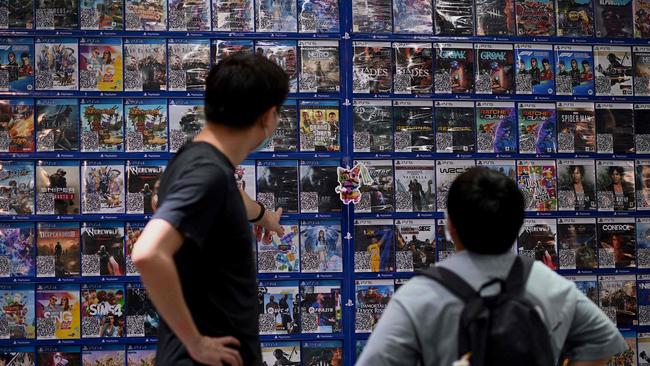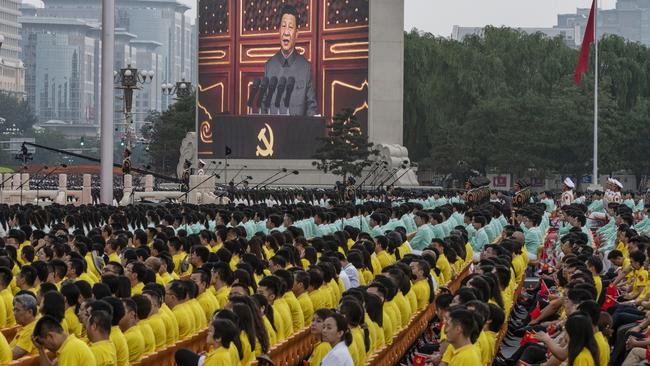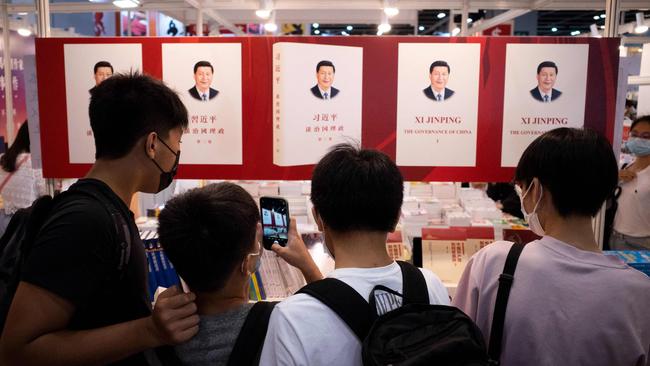China’s video game limits signal move to regulate private lives, shape next generation
Video game limits show Beijing intends to insert itself into the private lives of Chinese citizens to an extent not seen in decades.

Under President Xi Jinping, China’s Communist Party has moved to aggressively reassert control over the economy, going after some of the country’s largest private enterprises in a drive to dial back what it sees as the capitalist excesses of a previous era.
Now, the party, which is celebrating the 100th anniversary of its founding this year, is making it increasingly clear that it intends to insert itself into the private lives of Chinese citizens to an extent not seen in decades.
This week, party officials unveiled tough new limits on the amount of time Chinese young people can spend playing online games. The restrictions come amid a crackdown on pop culture icons and follow moves to sharply limit after-school tutoring.
Taken together, these moves represent a shift in the social contract that existed under Mr Xi’s two immediate predecessors, in which the party expanded personal freedoms in exchange for acquiescence to the party’s monopoly on politics.
The party says its aim is to more actively shape the next generation of Chinese people.
On Monday, state-run Xinhua News Agency described the new online gaming rules as an effort to “protect the physical and mental health of minors”—a move that came weeks after another state-backed media outlet called video games “opium for the mind.”
From now on, Chinese regulators said, they would effectively ban minors—those under 18 years old—from playing online video games from Monday to Thursday, and restrict them to one hour of gaming on the other three nights of the week plus public holidays.
Communist Party leaders have also gone after other influences on the lives of young people that they deem harmful. Among them: for-profit education services that have added to school pressures and a pop-culture industry that Beijing says has fostered an unhealthy culture of celebrity fandom around what state media terms effeminate male stars.
On Monday, Xinhua published a question-and-answer spelling out the government’s rationale behind its new video game regulations with language that echoed the 20th century Russian idea of a “new Soviet person.”
“The youth represent the future of the motherland,” the Q&A read, adding that ensuring the health of China’s young people “touches upon the nurturing of a new generation of man for the rejuvenation of the nation.”
The government’s recent focus is on children, whom the party says it fears are being inundated with a toxic culture that poisons their minds, isolates them from society and saps young boys of their masculinity.

Mr Xi signalled the new direction at China’s annual legislative meetings in March, when he told delegates to be wary of addiction to online games and “other dirty and messy things online” that could have a bad influence on young Chinese people.
The country’s powerful internet regulator, the Cyberspace Administration of China, kicked off the campaign in June when it announced plans to rein in the culture of online celebrity worship.
On Friday, it banned the ranking of celebrities by name on social-media platforms, saying only their songs and films could be ranked without mention of who created them.
Focus more on the performances, rather than the performers, the guidance said.
To help their favourite stars rise up the rankings on the Twitter -like Weibo platform or on the short-video app Douyin, which is operated by buzzy Beijing-based start-up ByteDance, circles of fans often engaged in frenzied competition to repost, like and comment on content about their favourite idols. Authorities said the competition often led to online trolling and excessive purchases of consumer goods promoted by celebrities.
The ban deals a blow to the entertainment industry, which has developed a business model based primarily on drawing the largest possible fan base—with more followers increasing the exposure for potential brand endorsements.
Chinese authorities have also taken aim at the influence of male celebrities who embrace a gender-neutral style, saying they encourage young Chinese men to be insufficiently manly.
Last week, state-owned newspaper Guangming Daily published a commentary denouncing what it called the spread of niangpao, or “sissy pants,” pop culture.
“The new era needs healthy aesthetics,” the commentary read, referring to the period under Mr. Xi’s leadership. A healthy social culture is crucial “in the critical period for the formation of adolescents’ values,” it read.
Around the same time, a group of celebrities and officials from China’s film industry gathered in Beijing to announce an initiative to distance themselves from “sissy pants” culture while creating “good work full of courage, morality and warmth.”
The attacks on insufficiently macho celebrities followed a notice from China’s Ministry of Education late last year warning that young Chinese men had become too “feminine” and urging schools to promote sports like soccer with a view to “cultivating students’ masculinity.”

Moves to mould the lives of China’s youth haven’t been limited to entertainment. In July, Chinese authorities imposed strict limits on the country’s lucrative for-profit education industry, which had exploded in response to demand from parents hoping to get their children a leg up in the country’s ultracompetitive schools.
The limits were intended in part to level the playing field for less wealthy families that couldn’t afford weekend and after-school tutoring sessions, but they were also aimed at producing more well-rounded children—or, as Mr. Xi put it, “socialist builders and successors that are fully schooled in morality, knowledge, sports, art, and labour.”
Xinhua’s Monday Q&A on the video game restrictions called for the public to “better guide minors to actively participate in physical exercise, community life, and a variety of colourful, healthy and beneficial recreational activities.”
The recent moves are part of “a comprehensive social transformation project” that speaks to public hunger for moral direction, said Zhan Jiang, a retired journalism professor at Beijing Foreign Studies University. “Such actions can win the hearts of the public,” he said.
It is unlikely to meet much resistance from the companies that benefited most from the earlier status quo. On Tuesday, the team in charge of “Honor of Kings,” the blockbuster role-playing smartphone game owned by Tencent Holdings, said it would implement the new restrictions but also went further, saying it would temporarily stop allowing players to access the game offline.
During a quarterly earnings call Tuesday, William Ding, chief executive of internet and game company NetEase, Inc., said the new regulations are a positive development for children’s health and studies, and predicted little financial impact since less than 1 per cent of the company’s revenue comes from gamers under 18.
“We vigorously endorse and support this decision, and will strictly implement it,” Mr. Ding said. “We also hope that the entire industry can actively carry out this decision, allowing China’s minors to grow up in a healthier environment.”
Wall Street Journal



To join the conversation, please log in. Don't have an account? Register
Join the conversation, you are commenting as Logout